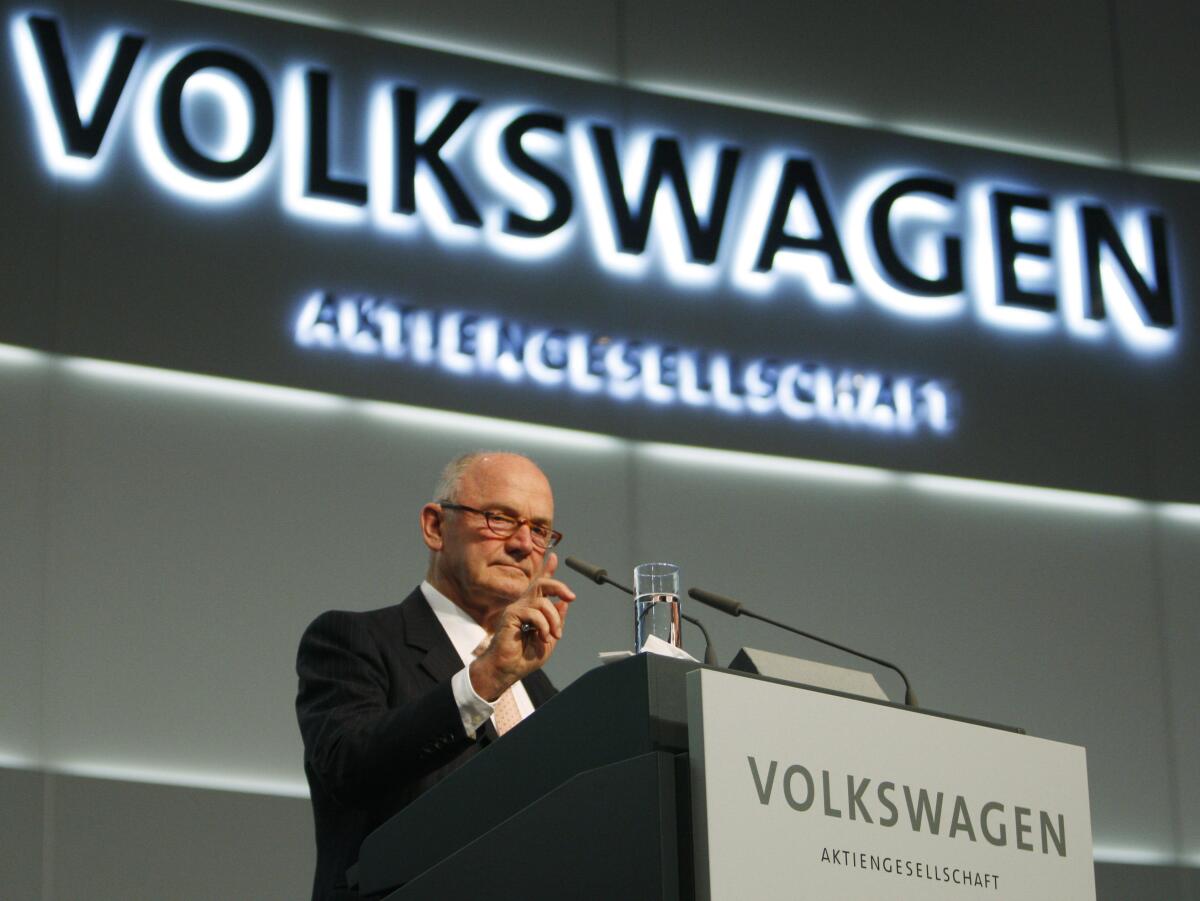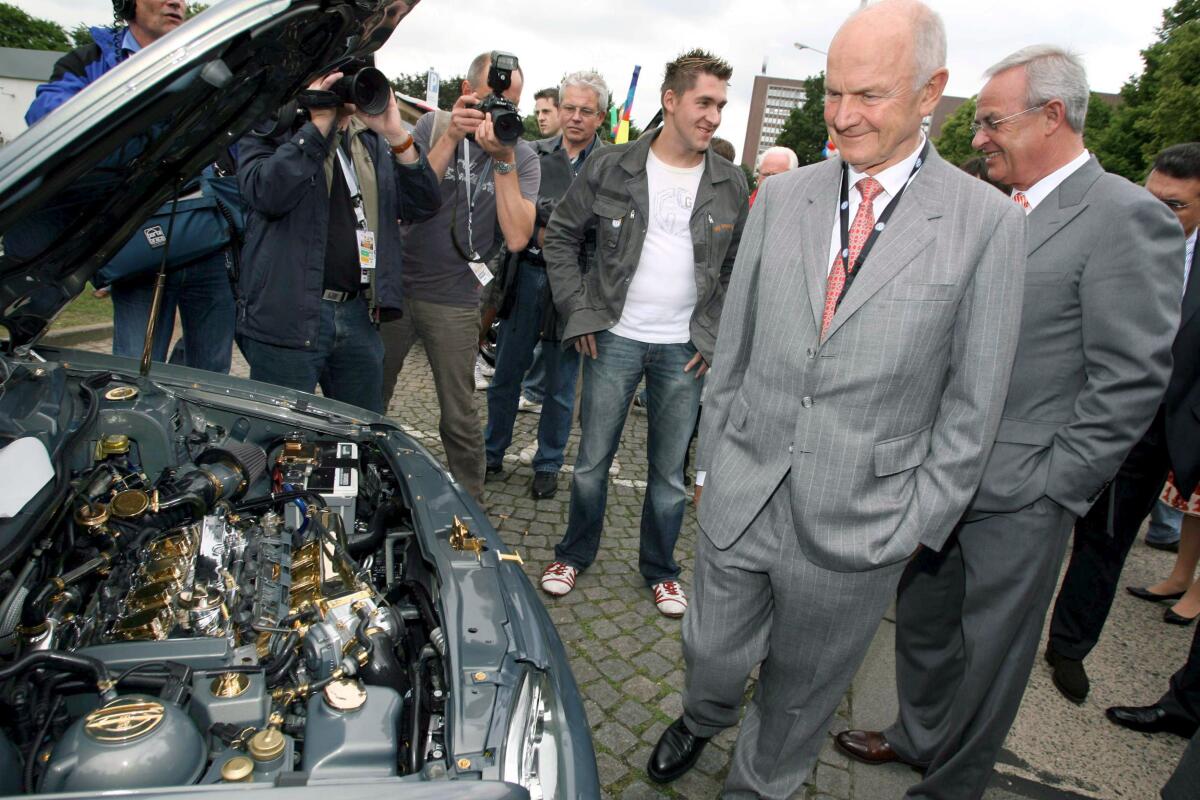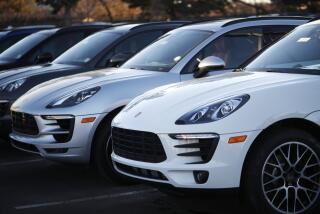Ferdinand Piech, who combined Porsche with VW, dies at 82

- Share via
Ferdinand Piech, the former chairman and chief executive who built Volkswagen into one of the world’s largest carmakers, then abruptly exited just before the emergence of a historic scandal, has died. He was 82.
Piech died Sunday evening at a clinic in Bavaria after a visit to a restaurant, German daily Bild reported. His wife, Ursula, confirmed in a written statement sent through a Berlin lawyer that her husband died “suddenly and unexpectedly” on Sunday, according to German news wire Deutsche Presse-Agentur. VW officials and representatives for the Piech and Porsche families had no immediate comment.
Piech, the grandson of Ferdinand Porsche, whose engineering firm laid the basis for the manufacturer of the 911 sports car, became VW’s CEO in 1993, when the Wolfsburg, Germany-based company was mired in losses. Plagued with quality problems and high costs, VW returned to profitability by producing better vehicles without large-scale job cuts, winning Piech the allegiance of unions and shareholders alike.

Piech continued to guide strategy after becoming supervisory board chairman in 2002. His authoritarian management style and thirst for acquisitions helped VW grow into a global automotive powerhouse that outsold Toyota Motor Corp. three years ago to become the world’s biggest carmaker.
His crowning achievement was the acquisition of the Porsche brand in 2012. The purchase was the final stage in turning the tables on his cousin, Wolfgang Porsche, who had pushed the Stuttgart, Germany-based sports-car producer to bid for VW four years earlier. Piech sided with the state of Lower Saxony, which owns a blocking stake in VW, to rebuff Porsche’s offer just as the suitor’s debt was surging from the takeover effort.
“His most significant achievement is that he built the largest and most successful automobile company in the world,” said John Wolkonowicz, an automotive historian who worked inside VW in Germany as a consultant in the 1990s. “And he built it from nothing.”
The combination of VW and Porsche united manufacturers that trace their roots to Piech’s grandfather, who developed the original VW Beetle car under a contract with Germany’s Nazi regime in 1934.
Under Piech, VW pushed into high-end autos with the purchase of the Bentley and Bugatti nameplates. At the same time, he tightened VW’s integration of the mass-market Seat and Skoda brands. By the end of 2012, Volkswagen either owned outright or held controlling stakes in 12 vehicle brands, including supercar producer Lamborghini, heavy-truck makers MAN and Scania, and motorcycle maker Ducati.
His obsession with cars — and the desire to make the best possible ones, regardless of price — also cost VW a lot of money. With the flopped Phaeton sedan, the Bugatti Veyron supercar and Audi’s A2 hatchback, the Volkswagen group accounts for three out of the 10 biggest money losers in modern automotive history, according to estimates from Max Warburton, an analyst for Sanford C. Bernstein & Co. That’s the worst track record in the industry.
Enjoying a cult-like following within the company, Piech often got his way when he lost confidence in managers, forcing out a series of executives, including his hand-picked successor as CEO, Bernd Pischetsrieder, in 2006. The supervisory board’s leadership committee surprisingly defied him in April 2015 by saying it would vote to extend Martin Winterkorn’s contract as CEO, against Piech’s wishes. Piech resigned as chairman later that month.
“If I want to achieve something, I approach the problem and push it through without realizing what’s happening around me,” he wrote in his 2002 autobiography. “My desire for harmony is limited.”
Piech’s legacy was tainted by the spectacular fallout with fellow family members and other VW key stakeholders over who was to blame for the manufacturer’s diesel emissions scandal, which has cost the company $33 billion so far and triggered the deepest crisis in its history.
Piech claimed he had mentioned indications of possible wrongdoing to other top officials in 2015 before U.S. authorities uncovered the large-scale emission manipulation months later, but that those warnings weren’t heeded at the time. His allegations were denied by his cousin Wolfgang Porsche as well as the other VW officials involved.
“Dieselgate put the final besmirchment on his career,” Wolkonowicz said. “Most people believe that because he was such a hands-on manager that he probably knew about it.”
Ferdinand Karl Piech was born April 17, 1937, in Vienna. His father, Anton, was a lawyer, and his mother, Louise, was the daughter of Ferdinand Porsche. The third of four children, Ferdinand Piech had two brothers and a sister.
After attending the Swiss boarding school Lyceum Alpinum Zuoz, near St. Moritz, from 1952 until 1958, he studied engineering at the Swiss Federal Institute of Technology in Zurich. In 1963, Piech went to work for his uncle Ferry at Porsche in Stuttgart, where he later became a technical manager.
Piech joined VW in 1972, when he moved to Audi from Porsche after the family decided to end its active role in the sports-car maker’s operations. At Audi, he pushed the development of the Quattro all-wheel-drive system, helping establish the brand as an innovator and later enabling it to overtake Daimler’s Mercedes-Benz in global luxury-car sales in 2011.
Earlier this year, the holding company for the Porsche and Piech family, Volkswagen’s main owners, said it may buy more shares in the carmaker. Porsche Automobil Holding, which owns about 53% of Volkswagen, said in March that VW’s market value doesn’t reflect its “vast potential.”
Piech arranged for his wife, a former kindergarten teacher and governess for his family during the 1980s, to be appointed to VW’s supervisory board in 2012. He and Ursula resigned their board seats in April 2015.
He had five children with his first wife, the former Corina von Planta; two from his relationship with Marlene Porsche, the former wife of his cousin Gerhard Porsche; three with Ursula Piech; and two other children.
More to Read
Inside the business of entertainment
The Wide Shot brings you news, analysis and insights on everything from streaming wars to production — and what it all means for the future.
You may occasionally receive promotional content from the Los Angeles Times.








